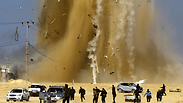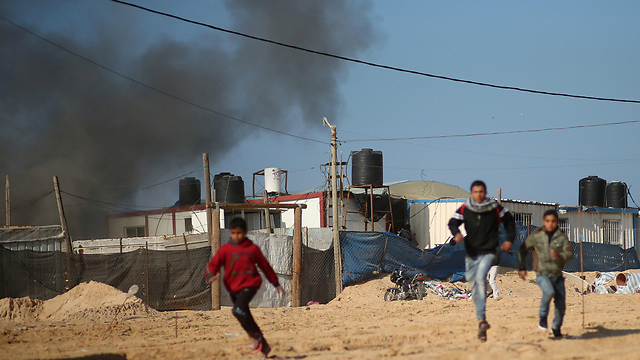
Hamas is hesitating, Israel is gambling
Analysis: Israeli officials are confident that the IDF can keep responding powerfully to occasional rocket fire from Gaza without the situation spiralling out of control. But that won’t last forever. At some point, the Palestinian organization may reach the conclusion that a certain strike is part of an Israeli plan to invade the strip.
Israel is striking massively in the Gaza Strip because it can. Not to mention the fact that these strikes serve what is called in military lingo “preserving deterrence.”
The new barrier is being built intensively on the border, and dozens of heavy tools and hundreds of people are hanging around the fence every day—a target for any worthless person or villain who might want to harm them and sabotage the work.
So Israel is using every opportunity it has to explain to Hamas that its job is to maintain the calm and not to get in its way, especially as these strikes are a chance to examine abilities and destroy targets. But all this would not be happening so intensely if Israeli officials were not confident that the level of response vis-à-vis Hamas could be raised without the situation getting out of control.

Hamas’ political and military conduct indicates that the Palestinian organization has been in a standby position for several months now and is pondering the right strategy for implementing its goals.
The Arab Spring, and mainly Operation Protective Edge, made it clear to Hamas that the military abilities it has demonstrated so far are not enough to shock Israel and make it accept dictations which would serve the Palestinian interest, primarily that of the Islamic stream.
At the same time, the cold shoulder the organization is receiving from the Arab world places it at a crossroads: Military moderation and a diplomatic initiative, or the opposite. For now, Hamas is choosing a diplomatic initiative—see its estrangement from the Islamic State in Sinai and its building up of a relationship with Egypt.
Contrary to what people in Israel think, Hamas see Protective Edge as a military failure on every possible parameter. They fired, for example, more than 20 anti-tank missiles at Israeli tanks, which were all neutralized by the Trophy active protection systems.
Not a single suicide bomber or roadside explosive charge managed to stop the IDF’s movement into the strip. Not a single surface-to-air missile hit an Israeli helicopter. The organization’s naval commando unit had no accomplishments. The tunnels provided a very partial result. Israel’s anxiety over the tunnels totally contradicts the frustration among members of Hamas’ military wing in light of the limited use of them: Not a single Israeli community was infiltrated, and not a single soldier or Israeli civilian was kidnapped through the tunnels.
These insights likely led Hamas to the conclusion that at the current stage it had better stop, build up its defensive capabilities and prepare—militarily and politically—for a future in which it would be able to present force which would surprise Israel.
Any move that may drag Israel into another round of violence in the strip would only disrupt this building of power.
Today, Hamas and the Islamic Jihad conduct rocket tests once a week—including heavier and longer-range missiles—from familiar sites like Deir al-Balah and the former settlement of Dugit, undisturbed.
The Iranians, after the nuclear agreement and the renewed flow of money, have become more generous too. This year, they granted Hamas’s military wing $150 million—double the amount given in the past.
The current waiting period is good for Hamas for internal reasons too, as it is preparing for elections in its institutions, which will take at least three months, until the election of a new leadership that will likely be headed by Ismail Haniyeh.
Members of Hamas’s military wing believe Israel is planning to take advantage of the organization’s temporary weakness in the interim period and attack Gaza at any given moment.
Their guess is that Israel is interested in dragging Hamas into a comprehensive conflict through a military provocation, and they are therefore making every effort to oppress any attempt by opposition groups to deteriorate the situation.
Israel can therefore continue to respond powerfully to occasional rocket fire from the strip and rely on the Qatari mediator to relay messages. But it won’t last forever. At what point will Hamas reach the conclusion that a certain strike is part of an Israeli plan to invade Gaza? That is Israel’s gamble.










